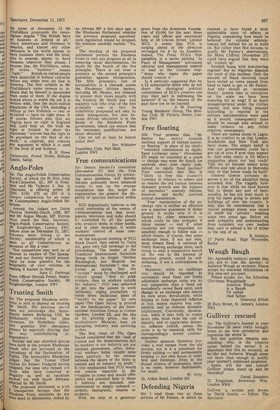Free communications
Sir: Dennis Hackett's contention (November 27) that the Free Communications Group, by attracting more members, will thereby become politically more balanced seems to rest on the strange assumption that the, larger an organisation the greater the disparity of opinions embraced within it.
FCG dogmatically believes in the social ownership of the means of communications and that newspapers, television and radio should be controlled by all the people who produce them; in other wards, and in plain language, it wants workers' control of mass communications.
At the inaugural meeting of FCG Black Dwarf, then edited by Tariq Ali, gave very full coverage to the proceedings. The leader of the Trotskyist International Socialism Group (with its slogan 'Neither Washington, nor Moscow but International Socialism') was reported as saying that the " syqem " must be challenged and control spread "first to print workers, then •to workers outside the industry." FCG was exhorted to get into the unions to work militantly, urging journalists to break down traditional ideas of "loyalty •to the paper." Its own paper -The Open Secret is printed at the headquarters of the International Socialism Group in Cotton Gardens, London E2, and the site of its printing press, run by revolutionary Marxists bent on disrupting industry and servicing strikes.
The first issue of The Open Secret considered that the 'lack of control and the dissatisfaction felt by workers in our industry are not isolated phenomena, other industrial workers being caught even more painfully by the tension between the desire of the State to control and of industry to profit." It also emphasised that FCG would not remain impartial in the struggles to come and would offer advice and practical help to those it believes are misused, misrepresented or simply unheard — strikers, immigrants, tenants or students,
With the help of a generous grant from the Rowntree Foundation of £6,000 for the next three years and offices and secretarial help at 30 Craven Street, London WC2, it seems that FCG is surging ahead in the direction envisaged for it by its founders. Indeed, The Press, FCG's first pamphlet in a series entitled 'In Place of Management' advocated editorial and management control to lead to the ultimate step: "those who make the paper should control it."
Is it seriously suggested that by a £2 subscription those who do not share the ideological political commitment of ECG's creators can play their part in redressing the balance? If so, the lessons of the past have yet to be learned.
S. M. Swerling Young Members' Group, The Monday Club, 52 Victoria Street, London SW1










































 Previous page
Previous page